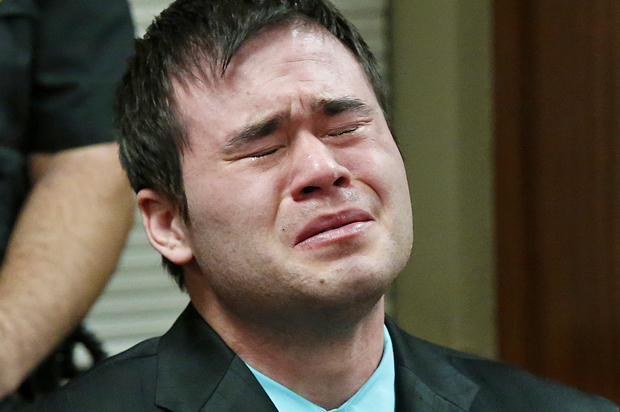It was a shocking outcome for a rape trial — shocking because it ended with convictions. On Thursday, former Oklahoma City police officer Daniel Holtzclaw was found guilty of 18 of the 36 charges against him involving eight of the thirteen women who have accused him of sexual assault. The 29 year-old’s convictions include first-degree rape, “forcible oral sodomy, sexual battery, procuring lewd exhibition and second-degree rape.” Holtzclaw, who will be sentenced next month, now faces 263 years in prison.
In court Thursday, Holtzclaw looked like a frightened kid, shaking visibly even before the verdict was handed down, and hanging his head and dissolving into tears as it was read. But during the trial, Holtzclaw’s accusers — ranging from a 17 year-old teen to a grandmother in her fifties — painted a very different portrait of the man they had encountered. To those women, he was a serial predator who abused his power and exploited their vulnerability. But that a jury agreed is almost unprecedented.
The Rape, Incest and Abuse National Network estimates that a stunning 97 percent of sexual assaults result in zero consequences for the assailants, either because the crime was never reported or because the case did not end in conviction. And as RAINN notes, “Because rapists tend to be serial criminals, this leaves communities across the nation at risk of predators.” Communities like the one in which Holtzclaw preyed.
From the beginning, Holtzclaw’s case sparked debate about race, class and privilege — Holtzclaw is a Japanese and Caucasian former athlete, his accusers were all African-American — and his jury was all white. In November, Benjamin Crump, president of the National Bar Association, declared that “We will be here to make sure that this is not swept under the rug. We come here to stand with these 13 victims of rape, who happen to be African-American women, to say that their lives matter, too.” The crimes occurred in low-income neighborhoods; the victims had histories of drug use and prostitution.
Last year, the Oklahoman reported that the alleged first assault took place “in one of the poorest census tracts in the state, where the median household income hovers around $14,000 a year.” Victims’ descriptions of what happened to them were consistent — a seemingly routine traffic stop, a check for outstanding warrants or prior arrests. And then, demands varying from having the women expose themselves to sex acts, with understanding they wouldn’t be punished “if you play by my rules.” One woman said he told her “This is better than county” before he sodomized and raped her. “He didn’t choose CEOs or soccer moms,” the prosecution said in its closing statements. “He chose women he could count on not telling what he was doing.” It seemed a pretty safe bet, didn’t it?
Women, black women, women who have been sex workers, who have been drug users, are rarely presumed to even have the right to make an accusation of rape. In a statement in September, Holtzclaw’s family said that “Witness and officer testimony presented by the prosecution… is based on solicited testimony by the police department of felons, prostitutes and others who would have personal motives beyond the basic truth to fabricate their stories.” Because felons and prostitutes don’t get sexually assaulted, right? Holtzclaw’s defense attorney Scott Adams used a similar strategy — as the Chicago Tribune reports, Adams “questioned several women at length about whether they were high when they allegedly encountered Holtzclaw. He also pointed out that most did not come forward until police identified them as possible victims after launching their investigation.”
That’s how this usually works. It’s an easy game of “Who’s More Credible?” — and it certainly seems an effective strategy if you happen to be a serial sex abuser. As one of Holtzclaw’s accusers explained in court, “I didn’t think anyone would believe me. I’m a black female.” On another day of testimony, a woman who said he’d taken her to a field and raped her after he’d pulled her over for going through a stop sign recalled, “I knew that it was going to be a sexual assault. There was nothing that I could do. He was a police officer, and I was a woman.” But this time, for a change, a jury believed a woman.
Watch: Former officer Daniel Holtzclaw sobs and shakes uncontrollably as he’s found guilty of raping 13 women while on duty
[jwplayer file=”http://media.salon.com/2015/12/DanielHoltzclaw.janetupadhye.12.11.2015mp41.mp4″ image=”http://media.salon.com/2015/12/daniel_holtzclaw2.jpg”][/jwplayer]


